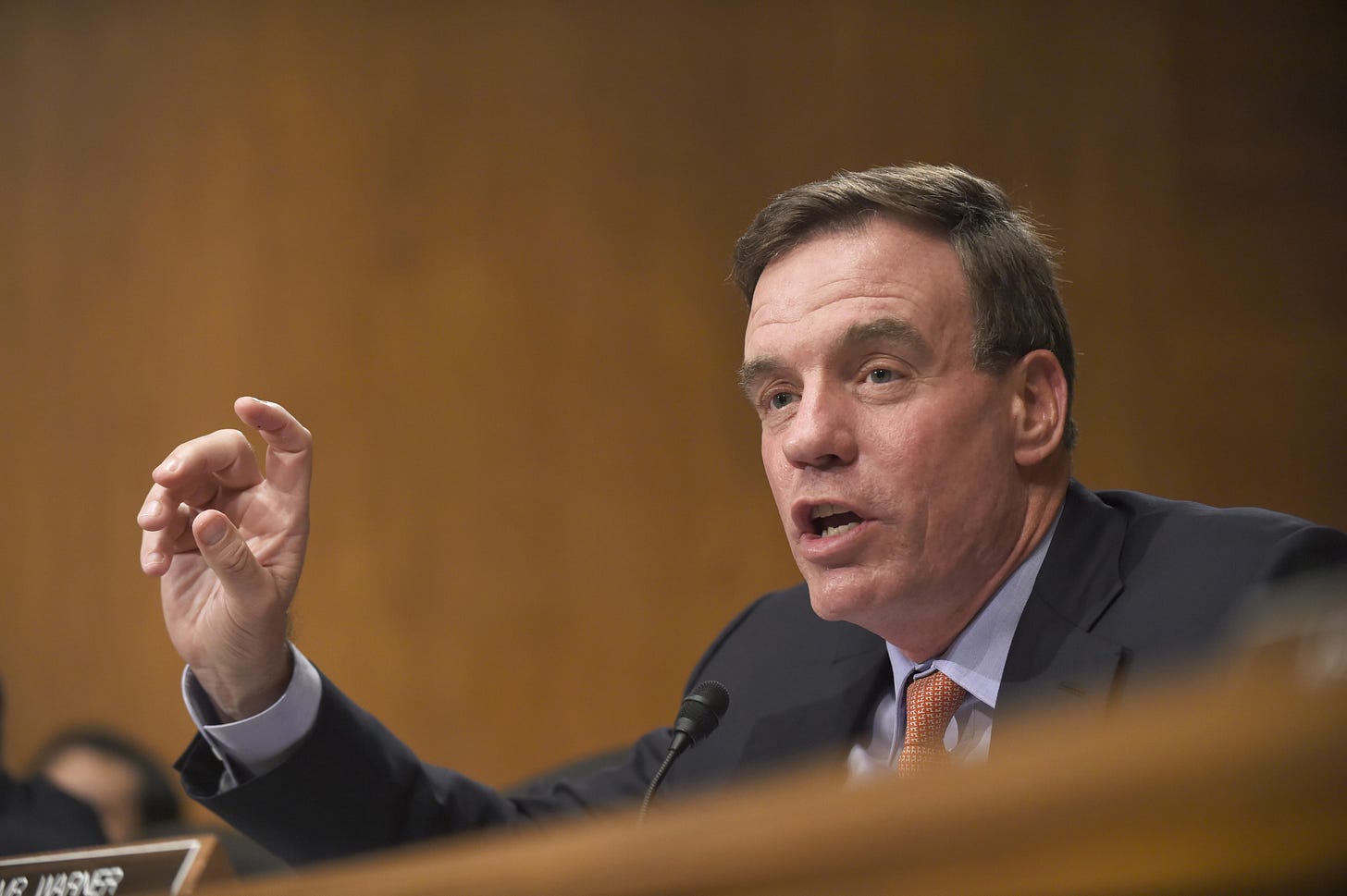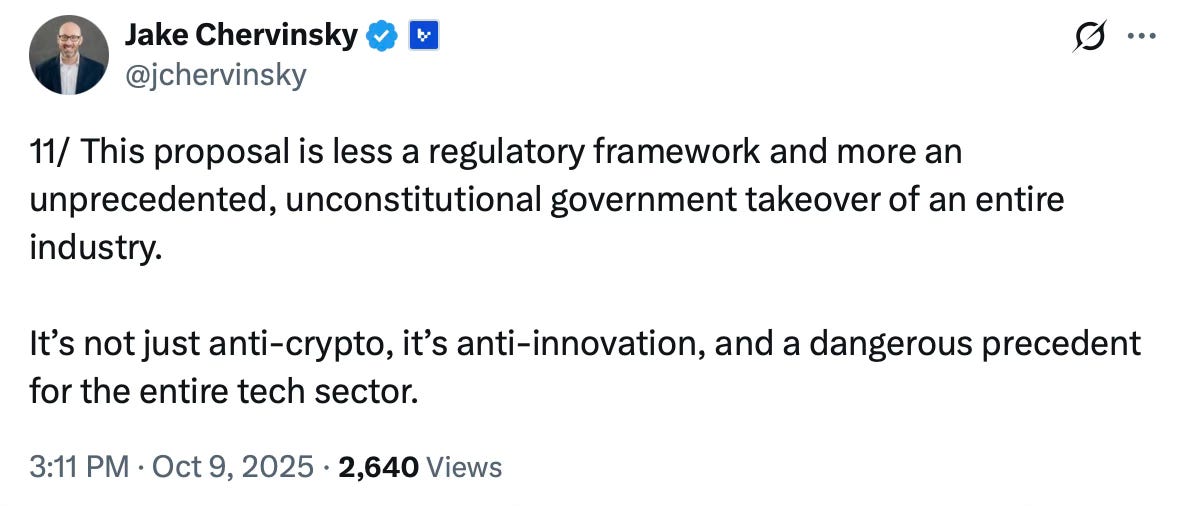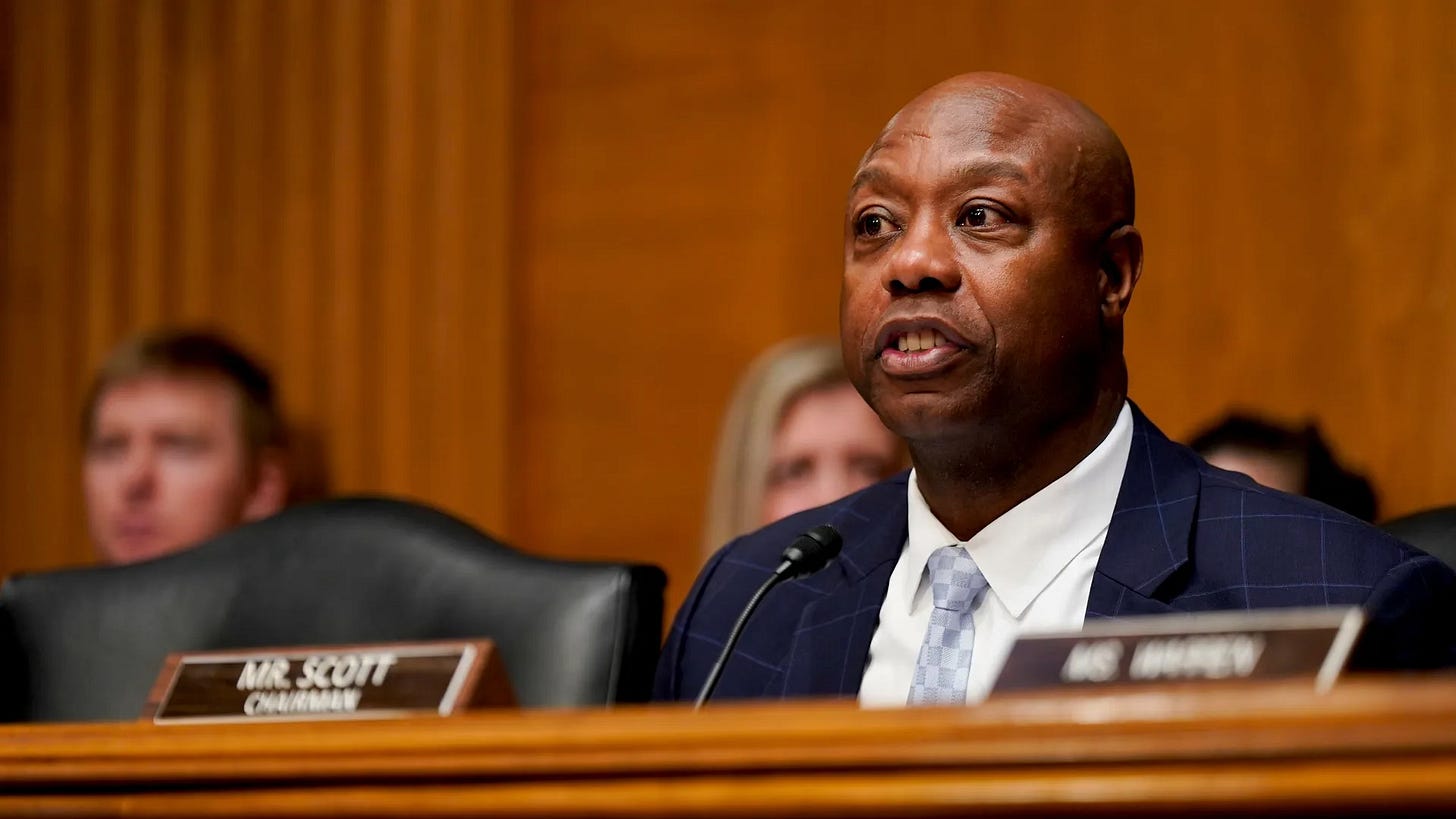Crypto Market Structure Talks Stall Over Leaked Dem DeFi Proposal
Dems want the pen, Republicans want a markup, industry wants fair rules for DeFi: inside the market structure showdown on Capitol Hill
Welcome to the Friday edition of the Crypto In America newsletter!
What you’ll read: Market structure talks stall as industry fumes over a new DeFi proposal and other top stories of the week.
Negotiations between Senate Republicans and Democrats over crypto market structure legislation have stalled after Democrats sent GOP counterparts a new proposal for regulating DeFi that sparked major industry backlash.
What happened? On Wednesday evening, Democrat staffers sent Republican staffers on the Senate Banking Committee a document titled “Preventing Illicit Finance and Regulatory Arbitrage Through Decentralized Finance Platforms,” which laid out a handful of proposals on how to regulate DeFi. The document was soon leaked to industry, and within hours, members of the crypto community were making frantic calls to each other and to Republican offices, asking whether what they were reading was real.
What was in the document? Broad rules for policing DeFi, labeling anyone who designs, deploys, operates, or profits from a front-end interface (website) as an intermediary. Industry is calling it overly broad, out of touch with the ethos of DeFi, and likely to kill off the decentralized ecosystem in the U.S., pushing software developers offshore and funneling users toward centralized platforms.
Critics, including Variant Fund’s Jake Chervinsky, say it gives government regulators unchecked power, raises First and Fourth Amendment issues, and could spark a wave of endless litigation. It also stands in stark contrast to the Republican draft released last month, which includes language that protects self-custody and software developers and earned broad support from the DeFi community.
The backlash. By Thursday morning, Democratic offices (mainly Virginia Senator Mark Warner, who serves as Vice Chairman of the Senate Intelligence Committee and is known for his rigorous approach to regulating DeFi) were flooded with angry calls from industry members, who said the new proposal was unworkable.
A source close to one of the offices receiving calls said the proposal was never meant to be a hard line.
“This was meant as a starting point for discussions, not a final position,” the source said, also noting their frustration that the document had been leaked.
The Republicans, meanwhile, are frustrated that their colleagues across the aisle remain misaligned on DeFi and, according to a spokesman, have offered little substantive feedback on the discussion drafts.
“What was sent to Republicans was not a legislative offer; the document was not written in legislative text, included multiple incoherent policy ideas, and was not a good-faith effort to engage on market structure,” said Banking Committee Communications Director Jeff Naft.
While both sides had been engaged in what sources described to Crypto In America as “productive discussions” in recent weeks, Republicans told Democrats on Wednesday that talks are now on hold until a date is agreed upon for the markup — the one Banking Committee leaders had originally planned for September 30.
Multiple sources have confirmed to Crypto In America that Republicans have been trying to set a date for late October, but Democrats have been reluctant to make it official, saying they want more time to work on a bipartisan draft. Last week, Senator Warner told Crypto In America he wasn’t ready to agree to a date yet, saying he wants to get the legislation right first.
The move to pause discussions has frustrated some Democratic offices, who are accusing their GOP counterparts of walking away from good faith negotiations.
“Democrats have shown up ready to work but our Republican counterparts are crashing out,” said Jacques Petit, Director of Communications for Senator Ruben Gallego (D-AZ), one of the twelve Democrats working on market structure negotiations. “Their demand to set a markup date before text is agreed to is like setting a wedding date before the first date. It’s nonsensical.”
Now what? With both sides pointing fingers, it’s unclear who will blink first: whether Democrats will agree to a markup date or Republicans will return to the negotiating table. The longer the stalemate drags on, the more likely getting a bill to President Trump’s desk will spill over into 2026, when Congress inevitably turns its attention to the midterms and crypto policy takes a backseat.
And there’s still the missing half of the bill.
While the Banking Committee hashes out the securities side, the Ag Committee continues to work on a bipartisan draft covering the commodities side. The latest there, Crypto In America has learned, is that Senator Cory Booker (D-NJ) is leading the discussions on behalf of Ranking Member Amy Klobuchar (D-MN), according to several people familiar with the matter.
Booker, who serves as Ranking Member of the Subcommittee on Commodities, Derivatives, Risk Management, and Trade, has long supported balanced crypto regulation and directed his staff to engage with Chairman John Boozman’s (R-AR) office on the legislation, though it’s unclear how far those talks have progressed.
At least two people familiar with the discussions say the committee is “not close” to releasing a draft.
In the meantime, the industry is just hoping Democrats soften their stance on DeFi.
Invest as you spend with the Gemini Credit Card®. Get approved to earn $200 in Bitcoin. Issued by WebBank. Terms apply.
Weekly Recap
ICYMI. Here are the biggest news stories this week from the intersection of Washington and Web3:
Grayscale launched the first spot staking crypto ETPs for Ethereum and Solana in the U.S.
ICE, the parent company of the New York Stock Exchange, announced a $2 billion strategic investment in blockchain-based prediction firm Polymarket, valuing the company at around $8 billion.
North Dakota will issue a state-backed stablecoin called Roughrider Coin, set to launch in 2026 and available to the state’s banks and credit unions as part of an effort to modernize interbank and merchant payments.
S&P Dow Jones Indices, the firm behind the S&P 500, will launch the S&P Digital Markets 50, an index of 15 cryptocurrencies and 35 crypto-related stocks.
The world’s largest asset custodian, BNY Mellon, has quietly been exploring tokenized deposits, or letting clients make payments via blockchain, according to Bloomberg.
Wealth management giant Morgan Stanley, advised allocating a small portion of portfolios to digital assets, suggesting exposure of 2% to 4% depending on risk appetite.
Nearly 60% of institutional investors plan to increase their digital asset exposure in the coming year and average exposure is expected to double within three years, according to a new report from asset manager State Street.
Coinbase and Mastercard are in negotiations to acquire stablecoin startup BVNK for around $2B, with Coinbase reportedly leading, per Fortune.
Roger Ver, the early crypto investor known as “Bitcoin Jesus,” has reached a tentative $48 million settlement with the DOJ over mail fraud and tax evasion charges, according to the New York Times.
Solana pulled in $2.85 billion in annual revenue, rivaling major Web2 firms like Palantir and Robinhood and outpacing Ethereum’s early growth.
Remember, new editions of the Crypto In America newsletter drop every Monday, Wednesday and Friday at 7AM EST.
If you like what you’re reading, don’t forget to subscribe!








